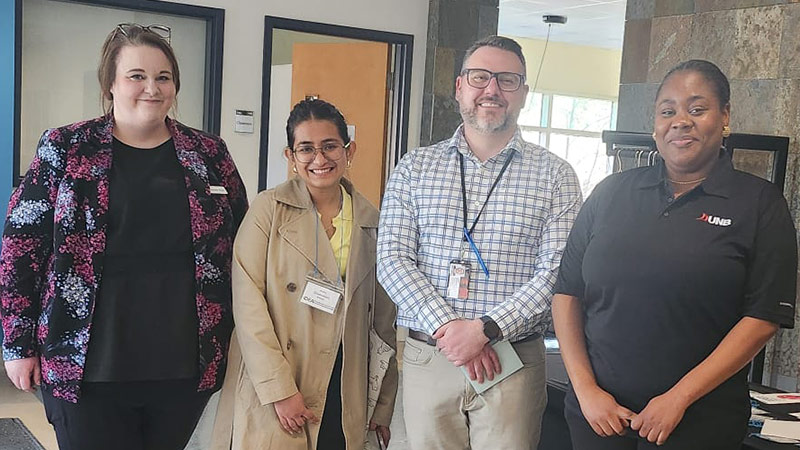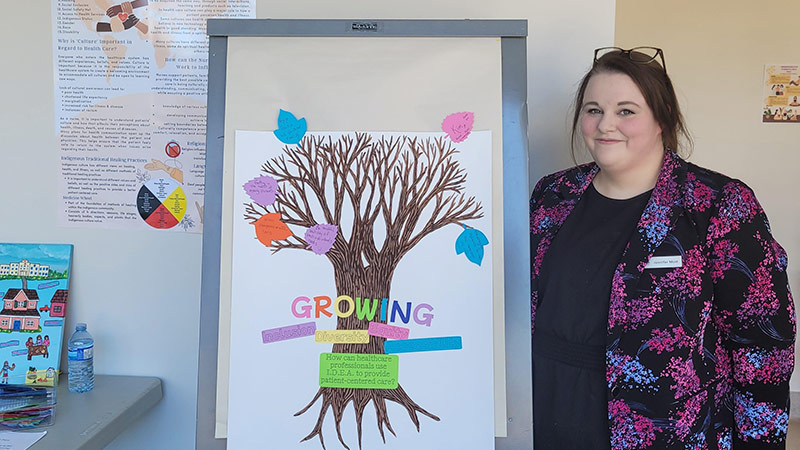UNB hosts inaugural conference on inclusion, diversity, equity and accessibility in healthcare
Author: Kayla Cormier
Posted on May 15, 2025
Category: UNB Saint John , Research

On May 1, 2025, UNB’s Saint John campus hosted the first-ever IDEA in Health Care Conference, bringing together students, healthcare professionals and community advocates to explore how culturally informed, inclusive care has the power to transform health outcomes in N.B. and beyond.
The Department of Nursing and Health Sciences at the University of New Brunswick (UNB) proudly hosted its inaugural conference, "Celebrating Individuality: Inclusion, Diversity, Equity, and Accessibility (IDEA) in Health Care," in Saint John on May 1, 2025.
This one-day event brought together a diverse group of keynote and breakout session speakers who shared their knowledge as well as their own unique stories and experiences with attendees.
The conference engaged students and community members in discussions around equity, diversity, inclusion and accessibility in healthcare—particularly in New Brunswick.
“These are critical conversations to be having,” said Dave Mazerolle, IDEA Conference Lead and assistant teaching professor in the Department of Nursing & Health Sciences. “They shed light on the current gaps in the system and spark ideas for solutions. This is how we can have a positive impact on the healthcare of tomorrow.”
The day began with a keynote address by Pamela Paul-Sappier and Deana Sappier.
Paul-Sappier, a registered social worker and proud Wolastoqey woman from Neqotkuk First Nation, shared insights from her 37-year-long career in child welfare, Indigenous mental health and addictions.
“Our people are distinct, and addressing mental health and addictions within our communities requires a deep understanding of our history and the ongoing challenges we continue to face,” she said.
Part of addressing these challenges means providing trauma-informed care in all programs of the Neqotkuk Health Programs & Services (NHPS).
“Even when we hire non-Indigenous professionals, we ensure that they are culturally aware, culturally safe and trauma-informed, because we don’t want any more harm done to our people,” Paul-Sappier said.
Sappier is the health director at NHPS, assisting the community of Neqotkuk, which is the largest rural Wolastoqiyik First Nation in N.B.
Sappier’s address touched on topics such as the Medicine Wheel teachings, which refers to a sacred symbol in many Indigenous cultures that provides a holistic approach to health and healing. The Wheel represents the interconnectedness of the individual, the community and the natural world.
She also highlighted how Indigenous determinants of health are unique in their focus on land-based healing and connecting to culture.
“Culture is the foundation of Indigenous health,” she said.
“We focus on intergenerational healing now because that's what we need to do. We're tired of talking about the traumas; there have been too many traumas in our past and with our people.”

The afternoon keynote address was delivered by Dr. Ingrid Waldron, HOPE Chair in Peace and Health in the Global Peace and Social Justice Program in the faculty of humanities at McMaster University.
Dr. Waldron's address focused on the impact of racism on mental health, particularly within Black communities.
"Trauma and other factors contribute to the poor mental health outcomes experienced by Black communities, including gender-based violence, state violence and other structural inequities and oppressions."
Dr. Waldron emphasized the need for mental health professionals to recognize and validate the unique experiences of racialized individuals and to engage in decolonizing mental health practices.
"Decolonizing mental health involves challenging the colonial and imperial legacies that reside in psychiatry and other mental health professions."
She highlighted the importance of interdisciplinary health education and training, dedicated research funding and the diversification of the healthcare workforce to better address the mental health needs of marginalized communities.
Her address called for a multi-level approach to understanding and addressing the structural determinants of health related to racism.
Conference attendees participated in breakout sessions led by special guests and champions of IDEA in the community, including:
- Alex Saunders: President, Saint John Pride
- Angela Parlee: Co-ordinator and outreach worker, Sussex Area Domestic Violence Outreach Program, Sussex Vale Transition House
- Jennifer Fox: Employment specialist, Hire Potential
- Keya Osbourne: Director of disability justice, Canadian National Institute for the Blind
- Louse Tardif: Autistic self-advocate, senior advisor for EDI at the New Brunswick Community College
- Mariah Darling: Education co-ordinator, Chroma NB
- Mohamed Bagha: Managing director, Saint John Newcomers Centre (SJNC)
- Samah El Maghlawy: General manager of newcomer connections, YMCA of Southwestern New Brunswick
For UNB and the Department of Nursing and Health Sciences, the event was a reminder of the power of collaboration—and the role they play in building a more inclusive and equitable healthcare system, both here in New Brunswick and beyond.
